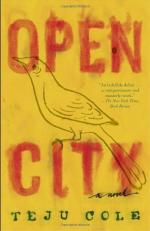
|
| Name: _________________________ | Period: ___________________ |
This test consists of 15 multiple choice questions and 5 short answer questions.
Multiple Choice Questions
1. What is Moji reading during her picnic in Central Park with Julius and his friend and his friend’s girlfriend Lise-Anne?
(a) Eugene Onegin.
(b) Anna Karenina.
(c) Notes From Underground.
(d) Hunter’s Sketches.
2. Who does Julius ask for help after being beaten and robbed?
(a) His friend.
(b) V.
(c) Nadège.
(d) Mary.
3. Whose obituary do the street performers make Julius think of?
(a) His oma’s.
(b) V.’s.
(c) His father’s.
(d) M.’s.
4. Where is there an explosion, in the dream Julius has in the beginning of Chapter 15?
(a) Wall Street.
(b) Brussels.
(c) A pet market in Basra.
(d) In Lincoln Center.
5. How does Julius characterize his grandfather’s status in Nigeria?
(a) Local official.
(b) Power broker.
(c) Respected craftsman.
(d) Inconsequential laborer.
6. Why does Julius go to Notre Dame de la Chapelle?
(a) He is early to meet Dr. Maillotte.
(b) He is meeting Dr. Maillotte there.
(c) He has always wanted to see it.
(d) He promised Nadège he would see it.
7. When Julius goes to the Munkasci exhibit at the Center of Photography, he thinks of the photographic concept of the “decisive moment” (152). Which photographer coined this term, and philosophy?
(a) Munkasci.
(b) Cartier-Bresson.
(c) Capa.
(d) Stieglitz.
8. Who does Julius feel watched by as he goes to the post office in Chapter 16?
(a) A policeman.
(b) A squirrel.
(c) A homeless man.
(d) A red-tailed hawk.
9. Who wrote the cantatas Julius had heard at Lincoln Center, before coming to visit Dr. Saito?
(a) Bach.
(b) Stravinsky.
(c) Tchaikovsky.
(d) Rachmaninov.
10. What is the white man teaching the Asian woman in the diner where Julius sees them in Chapter 18?
(a) Calculus.
(b) Latin.
(c) Chinese.
(d) English.
11. How does Julius regard the Africans he sees in Chapter 11, once he finds out where they really come from?
(a) Joyously.
(b) Spitefully.
(c) Angrily.
(d) Suspiciously.
12. When Julius goes to the club Le Panais, where does Julius say he thought all the Africans in Brussels were from?
(a) Congo.
(b) Ethiopia.
(c) Morocco.
(d) Liberia.
13. What does Julius notice is missing in Dr. Saito’s apartment in Chapter 14?
(a) Books.
(b) Mementos from Dr. Saito’s internment.
(c) Family photographs.
(d) Decorations.
14. Flying back to New York, Julius remembers having seen the city from a similar vantage point: when looking a vast scale model of the city. Where was that scale model exhibited?
(a) The Smithsonian.
(b) The Louvre.
(c) 1939 World’s Fair.
(d) 1964 World’s Fair.
15. What does Julius say the Statue of Liberty served as until 1902?
(a) A tourist destination.
(b) An immigration processing center.
(c) A lighthouse.
(d) A detention center.
Short Answer Questions
1. What does the fine weather on the day of the picnic in Central Park make Julius recall?
2. What does Moji say she actively worries about, during the picnic in Central Park?
3. What state is Dr. Saito’s helper Mary in when Julius goes to visit his friend in Chapter 15?
4. When Julius sees a police officer’ with a handgun in his travels, what does he say he envies about the gun?
5. What is the title Teju Cole gives to Part 2 of Open City, beginning with Chapter 12?
|
This section contains 550 words (approx. 2 pages at 300 words per page) |

|




